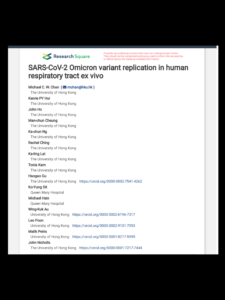Abstract: “Emergence of SARS-CoV-2 variants of concern (VOC) with progressively increased transmissibility between humans is a threat to global public health. Omicron variant also evades immunity from natural infection or vaccines1. It is unclear whether its exceptional transmissibility is due to immune evasion or inherent virological properties.
We compared the replication competence and cellular tropism of the wild type (WT) virus, D614G, Alpha, Beta, Delta and Omicron variants in ex vivo explant cultures of human bronchus and lung. Dependence on TMPRSS2 for infection was also evaluated. We show that Omicron replicated faster than all other SARS-CoV-2 in the bronchus but less efficiently in the lung parenchyma. All VOCs had similar cellular tropism as the WT. Delta was more dependent on serine protease than other VOCs tested.
Our findings demonstrate that Omicron is inherently able to replicate faster than other variants known to date and this likely contributes to its inherently higher transmissibility, irrespective of its ability to evade antibody immunity. The lower replication competence of Omicron in human lung may be compatible with reduced severity but the determinants of severe disease are multifactorial. These findings provide important biological clues to the transmissibility and pathogenesis of SARS-CoV-2 VOCs. “

